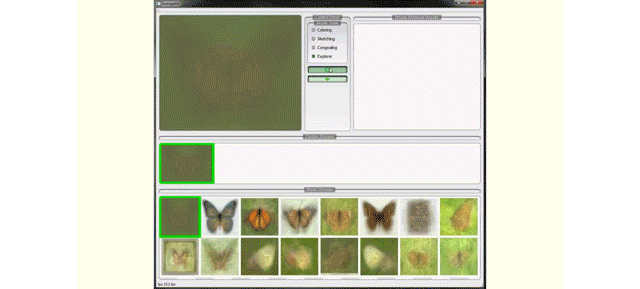Compared to searching for text, searching for images is super hard. But a new way to index and navigate through averaged images — those blurry composites that pull together millions of images into one — could radically change the way that we search for photos or products online.
Although image averaging is well-known for its artistic applications — like Jason Salavon’s Every Playboy Centerfold — a group of Berkeley computer scientists have built a tool called AverageExplorer that allows anyone to navigate their way through the most “average” images of any subject by highlighting certain visual characteristics. So when searching for an image of a particular cat breed, for example, you could easily nudge the images towards Siamese cats by highlighting bigger ears and darker faces.
It’s easier to understand if you see it in action.
Another example shows how you could almost use the image editor to “paint” the shoe that you want to see.
You won’t be able to play with it until the software is released in the fall, but its creators already have several real-world applications in mind, according to the New Yorker. Online shopping is a no-brainer, as people could pick products based on very specific physical attributes that they’d like their clothing to have. But one of the more intriguing applications could be employed by police investigating crimes, who must rely on often-inaccurate verbal descriptions from witnesses to put together sketches:
The software could eliminate what Efros calls the language bottleneck — the arduous conversion of a witness’s mental picture first into words, then into an artist’s imagined image, then into a sketch — by allowing witnesses to search among millions of faces for the features that most resemble those of the perpetrator, and, through AverageExplorer’s immersive process, to assemble the composite image themselves.
That “language bottleneck” is what pretty much all image searching is currently based on — we still have to find the words to describe what we see, and hope that someone else has tagged or described the image in the same way. Being able to pore over the internet’s most “average” images without words tripping up what we really mean might be the most powerful search tool of all. [AverageExplorer, New Yorker via 5 Intriguing Things]
